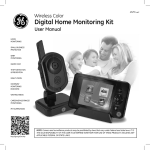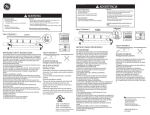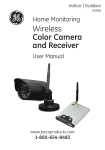Download Jasco 45254 Instruction Manual
Transcript
MOTION-ACTIVATED LED Security Light User Manual www.jascoproducts.com 1-800-654-8483 2 Thank you for purchasing the GE LED Security Light with Motion Activation control. This economical, energy efficient LED light has been designed to allow easy installation, flexible mounting options and provide exceptional light output with minimum power consumption. Please read all the Instructions carefully. Keep them for future reference. PARTS LIST Before installing please ensure all the following items are included in the package: LED Security light with two light housings and motion sensor 3 Wire Connectors TOOLS NEEDED Phillips head screwdriver #2 Mounting plate and screws Mounting Bolt Gasket GE Badge 3 Questions? Problems? Missing Parts? If you have any questions regarding the installation or operation of the product, Before returning to Retailer, please contact Technical Support at 1-800-654-8483,option 4. WARNING: Turn power off at circuit breaker or fuse box. Do Not rely on a wall switch alone to turn off power. Consult a local licensed electrician or electrical contractor if you are not sure about the installation. Always install wiring connections in accordance with local code, ordinances and National Electric Code. WARNING: The LED light output is strong enough to injure human eyes. Do not stare directly at the LEDs for more than a few seconds. 4 INSTALLATION Select an existing light fixture, either wall or eave mount for replacement. Note: The fixture must be connected to 120v, 60Hz power source. MOUNTING PREPARATION FOR THE LED LIGHT FIXTURE Note: For maximum flexibility, the LED Security Light can be mounted on a wall (vertical) or under the eave (horizontal). Eave Mount Wall Mount Lock Nut Adjustment Knob LED Housing Cover Housing Mounting Plate Motion Sensor Dusk/Dawn Adjustment Time Adjustment for Lights 5 Locate the adjustment knob and lock nut on the LED fixture. Loosen both and position LED light housings into the approximate position prior to mounting. For wall mount, the LED light housings should be positioned above the motion sensor. For under eave mount, position cover housing horizontally so that LED light housings are facing outward, away from the wall and motion sensor is positioned in front of LED light housings. Fine tune adjustment can be completed after LED light fixture is mounted to junction box. WIRE CONNECTION WARNING: Turn power off at circuit breaker or fuse box. Do Not rely on a wall switch alone to turn off power. 1. Remove the existing light fixture and disconnect house wires (black, white and ground). 2. Install mounting plate to junction box as shown using two mounting screws (included). Install screws until snug so that mounting plate does not move. Do not over tighten screws. See Fig. A. 3. Position gasket over junction box. Route black, white and ground house wires through one of the large openings of the gasket. See Fig. B. Fig. A Fig. B 6 4. Locate black, white and ground wires coming from LED light fixture. Strip wires 3/8” (9.5mm) if not previously stripped. Hold BLACK house wire and BLACK fixture wire together with ends even. Align any frayed strands or conductors. Push wires into wire nut and screw ClockWise until two twists are visible in the wires. Repeat above procedure for both the WHITE house wire and the WHITE fixture wire. Repeat above procedure for both the GREEN or BARE COPPER house wire and the BARE COPPER fixture wire. Gasket Mounting Plate Black to Black White to White ! House ground wire to copper ground wire from fixture 5. Insert mounting bolt through center of cover housing as shown. Align mounting bolt thru the small center hole of gasket to hold gasket in place. Position cover housing and gasket over the junction box. Align center bolt with center hole of mounting plate. Using Phillips screwdriver, screw mounting bolt into mounting plate until LED light fixture is snug; do not over-tighten. 6. Cover mounting bolt by inserting GE badge into hole; align badge with mounting slots. Press in until snug. 7. If a location junction box was not used, caulk edge of cover housing surface with silicone weather resistant sealant (not included). ! ! 7 ADJUSTING LIGHT HOUSINGS Adjustment Knob 1. Slightly loosen adjustment knob and lock nut for one housing at a time. Gently position LED housing to final desired position. Tighten adjustment knob and lock nut. If necessary, follow same adjusting for the other Light Housing. 2. Turn on power at circuit breaker or fuse box. Turn on light switch (if present). Check LED light output to ensure proper coverage. TEST MODE, INITIAL SET-UP Note: After power is turned on, the motion sensor requires approximately one minute to ‘warm-up’ before it will detect motion levels. Time Dark MAX MAX TEST The LED light fixture is pre-set to the ‘TEST’ mode from the factory to help you position the motion sensor so it can detect motion in the desired area. In ‘TEST’ mode, the LED lights will turn on for approximately 5 seconds each time motion is detected (including during daylight). After completing the test set-up, you can adjust the time the lights remain on from 1 to 10 minutes (variable). While in ‘TEST’ mode the lights will turn on during daylight. OPTIMIZED LIGHT OUTPUT Provides a variety of lighting applications. Simply adjust the angle of the lights. Focused spot with surrounding flood for entrances, driveway or cars, gate access, etc. Broad spot with expanded flood for yards, large areas, decks, etc. Focused flood for fence line, shed or remote building, detached garage, side of house, boat, trailer, etc. 8 MOTION SENSOR POSITION SET-UP Note: The motion detection range has been set to a maximum sensitivity, up to 60ft. This is the optimum, reliable distance. At longer distances, there is a greater tendency for ‘false activations’. Maximum sensitivity distance will vary based on outside conditions (temperature, weather), mounting location and detection angle. 1. Ensure power is turned on to the LED Light fixture. 2. Loosen the adjustment knob and lock nut for the motion detection sensor and position it so points outward toward the approximate middle of the area to be detected. Lock nut 3. Angle the Motion sensor slightly downward (approximately 10-15°). This will create a maximum detection area with the most accuracy, from 6ft to 60ft. Too Far To Close Adjustment Knob Best Option Avoid pointing sensor too far downward as this will reduce detection coverage and overall distance. If the sensor is pointed too high, it may not detect movement closer to the fixture. It may be necessary to make minor adjustments until you have the sensor set to the optimum position. 4. Position the sensor so any areas to the far left or far right are covered. Distance outward from the sensor is fixed, so no adjustments are necessary. The detection pattern is similar to a half circle, however it will detect farther ahead than on each side. 9 Important Note: (1) Do not point motion sensor toward bright lights or reflective surfaces as this will affect accuracy of the motion sensor. (2) Avoid areas with heavy traffic or pet areas as this may trigger lights consistently. (3) Avoid pointing sensor directly towards severe temperature surfaces such as heating vents, air conditioners, driveway or asphalt surfaces, large light-colored objects that reflect heat, or other light sources. These heat sources can generate ‘false activations’ and reduce motion sensor distance. 5. Ensure the ‘Time’ knob is set to ‘TEST’ (rotate Dark Time counter-clockwise to left). The Dark knob is set to the minimum position (rotate counter-clockwise TEST to left). In this ‘TEST’ mode, the lights will turn on for 5 seconds after motion is detected and then turn off. In the ‘TEST’ mode, the lights will turn MAX MAX on during daylight. 6. To test motion activation coverage, walk through detection area noting your position when the lights turn on. To increase the coverage area, raise the motion sensor up slightly. To reduce the coverage area, position the sensor downward slightly. Once optimum coverage set, tighten lock nut and adjustment knob until snug. Do not overtighten. 7. Once you have completed the test set-up, adjust the ‘Time’ setting from ‘Test’ position from 1 to 10 minutes as desired. When out of ‘TEST’ mode, the LEDs lights will not turn on during daylight hours when motion is detected. 10 DUSK/DAWN LIGHT LEVEL ACTIVATION SETTING Time The LED light fixture has an adjustable light level activation setting labeled ‘Dark’. This adjustment allows you to determineTEST when the LED lights will turn on based upon the darkness level outside. In some situations, depending upon on where the fixture is located, you may wish to have the LED lights turn on sooner (example-the LED light fixture is positioned in a shaded area). Or you may wish MAX to have the LED lights turn on when it is darker outside.(example the LED light fixture is located in an area that receives direct afternoon sunlight). Time Dark MAX Dark 1. To set lights to turn on under darker conditions, rotate DARK TEST knob to the right (clockwise) to ‘Max’ position. 2. To set lights to turn on under lighter conditions turn rotate knob to the left (counter-clockwise) to ‘Min’ position. TEST 3. It may be necessary to make minor adjustments until satisfied with activation levels. MAX MAX Time Dark MAX MAX 11 LED LIGHT-ON TIME SETTING Dark Dark Time Time The LED light fixture has an adjustable time setting that determines the length of time the LED lights will TEST TEST remain on after motion is detected. You can adjust the light-on time from 1 minute to 10 minutes. Adjust the ‘Time’ setting from ‘Test’ position from 1 to10 minutes as desired. Note: In the ‘TEST’ setting, MAX MAX MAX MAX the lights will turn on for 5 seconds after motion is approx. 1 mm approx. 10 mm detected and then turn off, and will turn on during daylight. HOW DOES MOTION DETECTION WORK? Motion sensors are actually heat sensors. Motion Sensors detect motion by monitoring changes in heat within the detection area. As a person enters the detection area, the sensor compares the outside temperature with the body temperature of the person within the detection area. As the person moves within the detection area, the heat measurements change. Motion Sensors determine these changes to be ‘movement’. All motion sensors are more sensitive to movement across the detection area, and less sensitive to movement toward the sensor. The Motion Sensor on the GE LED Security Light is designed to detect motion up to 180°, and outward from the fixture from 6ft up to 60ft. Less Sensitive More Sensitive FCC Statement This device complies with Part 15 of the FCC rules. Operation is subject to the following two conditions: (1) this device may not cause harmful interference, and (2) this device must accept any interference received, including interference that may cause undesired operation. FCC Note: The manufacturer is not responsible for any radio or TV interference caused by unauthorized modifications to the equipment. Such modifications could void the user’s authority to operate the equipment. WARNING Risk of electric shock - Turn power off before servicing—see instructions. - Properly ground fixture. - Ensure that no bare wires are exposed outside the electrical connections. Risk of injury - LED light output is strong enough to injure human eyes. Precautions must be be taken to prevent looking directly at the LEDs with unaided eyes for more than a few seconds. - Some metal parts in the fixture may have sharp edges. To prevent cuts and scrapes, wear gloves when handling the parts. - Account for small parts and destroy packing material, as these may be hazardous to children. Risk of fire - Minimum 90º C supply conductors No serviceable parts Non-replaceable LEDs NOTE: This equipment has been tested and found to comply with the limits for a Class B digital device, pursuant to Part 15 of the FCC Rules. These limits are designed to provide reasonable protection against harmful interference in a residential installation. This equipment generates, uses and can radiate radio frequency energy and, if not installed and used in accordance with the instructions may cause harmful interference to radio communications. However, there is no guarantee that interference will not occur in a particular installation. If this equipment does cause harmful interference to radio or television reception, which can be determined by turning the equipment off and on, the user is encouraged to try to correct the interference by one or more of the following measures: • Reorient or relocate the receiving antenna. • Increase the separation between the equipment and receiver. • Connect the equipment into an outlet on a circuit different from that to which the receiver is connected • Consult the dealer or an experienced radio/TV technician for help GE is a trademark of General Electric Company and is used under license to Jasco Products Company LLC, 10 E. Memorial Road, Oklahoma City, OK 73114. www.jascoproducts.com 45254 rev. 5/23/11






















